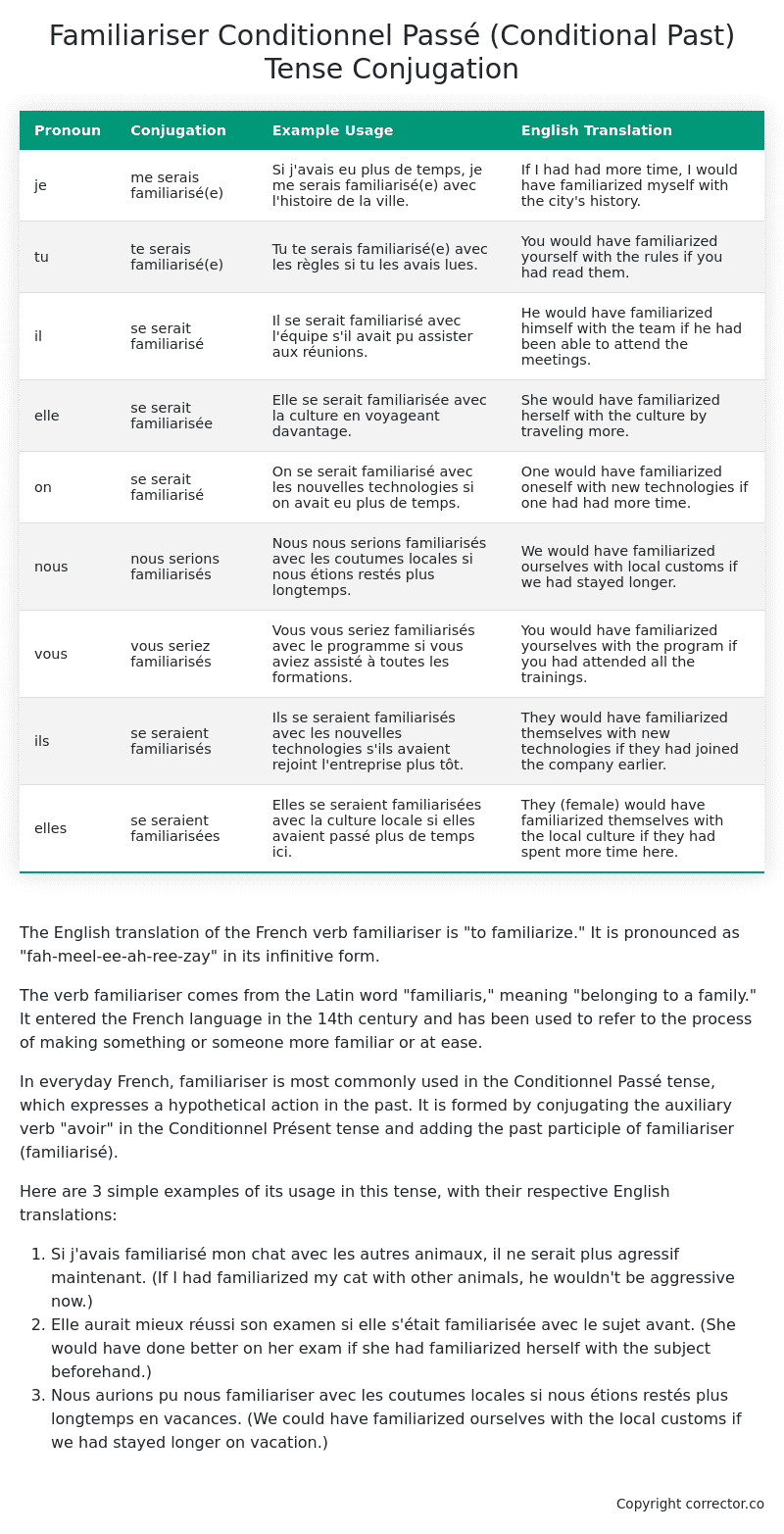Conditionnel Passé (Conditional Past) Tense Conjugation of the French Verb familiariser
Introduction to the verb familiariser
The English translation of the French verb familiariser is “to familiarize.” It is pronounced as “fah-meel-ee-ah-ree-zay” in its infinitive form.
The verb familiariser comes from the Latin word “familiaris,” meaning “belonging to a family.” It entered the French language in the 14th century and has been used to refer to the process of making something or someone more familiar or at ease.
In everyday French, familiariser is most commonly used in the Conditionnel Passé tense, which expresses a hypothetical action in the past. It is formed by conjugating the auxiliary verb “avoir” in the Conditionnel Présent tense and adding the past participle of familiariser (familiarisé).
Here are 3 simple examples of its usage in this tense, with their respective English translations:
- Si j’avais familiarisé mon chat avec les autres animaux, il ne serait plus agressif maintenant. (If I had familiarized my cat with other animals, he wouldn’t be aggressive now.)
- Elle aurait mieux réussi son examen si elle s’était familiarisée avec le sujet avant. (She would have done better on her exam if she had familiarized herself with the subject beforehand.)
- Nous aurions pu nous familiariser avec les coutumes locales si nous étions restés plus longtemps en vacances. (We could have familiarized ourselves with the local customs if we had stayed longer on vacation.)
Table of the Conditionnel Passé (Conditional Past) Tense Conjugation of familiariser
| Pronoun | Conjugation | Example Usage | English Translation |
|---|---|---|---|
| je | me serais familiarisé(e) | Si j’avais eu plus de temps, je me serais familiarisé(e) avec l’histoire de la ville. | If I had had more time, I would have familiarized myself with the city’s history. |
| tu | te serais familiarisé(e) | Tu te serais familiarisé(e) avec les règles si tu les avais lues. | You would have familiarized yourself with the rules if you had read them. |
| il | se serait familiarisé | Il se serait familiarisé avec l’équipe s’il avait pu assister aux réunions. | He would have familiarized himself with the team if he had been able to attend the meetings. |
| elle | se serait familiarisée | Elle se serait familiarisée avec la culture en voyageant davantage. | She would have familiarized herself with the culture by traveling more. |
| on | se serait familiarisé | On se serait familiarisé avec les nouvelles technologies si on avait eu plus de temps. | One would have familiarized oneself with new technologies if one had had more time. |
| nous | nous serions familiarisés | Nous nous serions familiarisés avec les coutumes locales si nous étions restés plus longtemps. | We would have familiarized ourselves with local customs if we had stayed longer. |
| vous | vous seriez familiarisés | Vous vous seriez familiarisés avec le programme si vous aviez assisté à toutes les formations. | You would have familiarized yourselves with the program if you had attended all the trainings. |
| ils | se seraient familiarisés | Ils se seraient familiarisés avec les nouvelles technologies s’ils avaient rejoint l’entreprise plus tôt. | They would have familiarized themselves with new technologies if they had joined the company earlier. |
| elles | se seraient familiarisées | Elles se seraient familiarisées avec la culture locale si elles avaient passé plus de temps ici. | They (female) would have familiarized themselves with the local culture if they had spent more time here. |
Other Conjugations for Familiariser.
Le Present (Present Tense) Conjugation of the French Verb familiariser
Imparfait (Imperfect) Tense Conjugation of the French Verb familiariser
Passé Simple (Simple Past) Tense Conjugation of the French Verb familiariser
Passé Composé (Present Perfect) Tense Conjugation of the French Verb familiariser
Futur Simple (Simple Future) Tense Conjugation of the French Verb familiariser
Futur Proche (Near Future) Tense Conjugation of the French Verb familiariser
Plus-que-parfait (Pluperfect) Tense Conjugation of the French Verb familiariser
Passé Antérieur (Past Anterior) Tense Conjugation of the French Verb familiariser
Futur Antérieur (Future Anterior) Tense Conjugation of the French Verb familiariser
Subjonctif Présent (Subjunctive Present) Tense Conjugation of the French Verb familiariser
Subjonctif Passé (Subjunctive Past) Tense Conjugation of the French Verb familiariser
Subjonctif Imparfait (Subjunctive Imperfect) Tense Conjugation of the French Verb familiariser
Conditionnel Présent (Conditional Present) Tense Conjugation of the French Verb familiariser
Conditionnel Passé (Conditional Past) Tense Conjugation of the French Verb familiariser (this article)
L’impératif Présent (Imperative Present) Tense Conjugation of the French Verb familiariser
L’infinitif Présent (Infinitive Present) Tense Conjugation of the French Verb familiariser
Struggling with French verbs or the language in general? Why not use our free French Grammar Checker – no registration required!
Get a FREE Download Study Sheet of this Conjugation 🔥
Simply right click the image below, click “save image” and get your free reference for the familiariser Conditionnel Passé tense conjugation!

Familiariser – About the French Conditionnel Passé (Conditional Past) Tense
Formation
Common Everyday Usage Patterns
Expressing Unreal Past Scenarios
Polite Requests or Suggestions
Expressing Doubt or Uncertainty
Interactions with Other Tenses
Conditional Present
Indicative Past Tenses
Conditional Future
Summary
Want More?
I hope you enjoyed this article on the verb familiariser. Still in a learning mood? Check out another TOTALLY random French verb conjugation!


